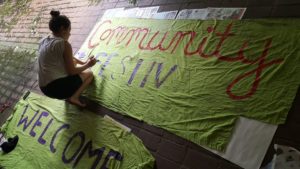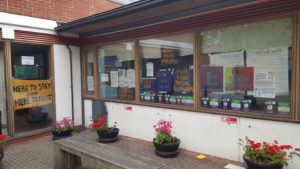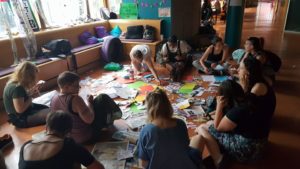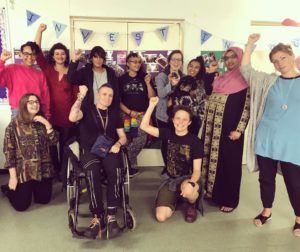NO POLICE IN OUR WOMEN’S BUILDING – Fill out the survey
Friday, June 9, 2023
The Women’s Building* that Peabody has promised to build on the site of Holloway Prison is at risk of housing probationary services.
Formerly the largest women’s prison in Europe, Holloway prison was a site of intense violence and harm. The Women’s Building was demanded by the community, to be a space for healing and support for people who have experienced violence at the hand of the state.
Embedding probationary services into the Women’s Building would be the complete opposite of what the community demanded. We do not want more policing of our communities. We do not want a prison under another name. We want a Women’s Building that works in the interests of us all.
We are asking people to fill out this survey from Peabody to make it clear that we want no probationary services in the Women’s building, that the building should provide specialised services for all survivors and that the building should be for women, non-binary and intersex people, and their children.
Please use our answers below as a guide, but use your own words.
GUIDE ANSWERS
QUESTION ONE
Choose ‘not important’ to the suggestion of ‘Probation referrals’.
Choose ‘other’ and in the text box specify that:
- We need specialist services for Black survivors and survivors of colour, LGBT* survivors (emphasise the need for all services to be fully trans-inclusive), D/disabled survivors, and women, intersex and non-binary people who were formerly incarcerated.
- There should also be a safe injection site/needle exchange.
- No services in the building should be linked to the Criminal Justice System.
- All services should be run by organisations that recognise the harms perpetuated by the Criminal Justice System.
- All services should be free at the point of use.
QUESTION TWO
Choose ‘not important’ for ‘commercial space’.
Choose ‘other’ and note that the space should also:
- Include a kitchen
- Be fully accessible
- Be free at the point of use
Note that there should be no commercial space in the building.
QUESTION FOUR
Choose ‘not relevant’ for ‘exclusive use for women only’ and then clarify in the text box below that it is important that the space is for women (trans and cis), non-binary and intersex people and their children.
Choose ‘other’ and note in the text box that:
- There must be no connection to the Criminal Justice System (including immigration enforcement).
- All services, including childcare, must be offered free at the point of use.
QUESTION FIVE
Strongly state that there must be no probation services in the building. Probation services are an arm of the Criminal Justice System that entrench state surveillance in the lives of formerly incarcerated people and set near impossible standards and codes of behaviour that they must adhere to. Probation services are another way that the Criminal Justice System cements itself in the lives of those currently and formerly imprisoned.
Probation services are not spaces for healing or support.
When the Community came together to demand a Women’s Building, the vision was that it would be a place of healing for those who have experienced violence at the hands of the state. It should work to rectify the pain and trauma inflicted by prisons and the Criminal Justice System. This can only happen if it is completely independent of these systems. No services that are linked to or co-operate with the Criminal Justice System should be housed in the building.
Services provided must not cooperate with the Home Office or Ministry of Justice in any capacity or deny access to individuals on the basis of immigration status.
*’Women’s Building’ is the term used by the Council, Peabody and some community groups. We insist that the building must be inclusive of all women (trans and cis), non-binary and intersex people.
Why we plastered our demands on the fence of Holloway Prison
Friday, October 11, 2019
The death of a newborn baby in HMP Bronzefield just two weeks ago reveals the violence of the prison industrial complex. An incarcerated woman was left to deliver the baby with no pain relief or medical assistance overnight. This horrific story is just one of countless examples of the criminal justice system’s structural brutality. These incidents happen in secret, out of the public eye, because so often women in prison aren’t deemed worthy of our care and protection.
Holloway Prison has been the site of similar state violence for centuries. The prison population is overwhelmingly made up of people experiencing mental health problems, those who have experienced sexual violence, and people who have grown up in care. Sarah Reed, a 32-year-old working-class black woman with mental health support needs, died in Holloway Prison in January 2016 after a long journey of state-inflicted violence. Instead of receiving the mental health support she needed after losing her child, Sarah was subjected to abuse time and time again. The multiple instances of violence perpetrated against Sarah included an assault by an officer of the Metropolitan Police, which led to further deterioration of her mental health due to the trauma, and an attempted rape while she was later detained in a psychiatric unit under the Mental Health Act. When she died, she had been in HMP Holloway on remand for more than three months. Sarah’s story is one of many: too many to name.
When Holloway Prison first closed in 2016, many of the women inside were transferred to overcrowded facilities outside of London, further isolating them from their support networks, family and resources. The violence that took place on the site of Holloway Prison remains unhealed. Prisons do nothing to solve social problems; they are simply a management method for filtering out the ‘undesirables’ from our society. We know that they are rife with abuse, exploitation and mistreatment. We also know that once inside the prison system, chances of successful ‘rehabilitation’ for the poorest and most marginalised women is next to none. Sisters Uncut believe that nobody deserves to suffer silently as a result of state violence. We seek to expose violence, to bring it into the public eye, in order to demonstrate that the way our society functions and the way the state allocates funds and resources is fundamentally racist and sexist.
The fight to reclaim Holloway
We occupied the site of Holloway Prison in 2017, hosting a week-long community festival in the visitor centre. We wanted to demonstrate that the land could be transformed into a space of healing and safety. We demanded the use of the principles of transformative justice as an alternative to the carceral state.
Our original demands, that the site be used for social housing and the construction of a women’s building, were initially agreed to by the council. However, these promises have been threatened by the developers’ cooperation with the police. Peabody Trust, the housing association which bought the site in March this year, is working with the Mayor’s Office for Police and Crime (MOPAC) to finance and direct the construction of the site. Sisters Uncut asserts that this relationship poisons the potential for creating a space committed to transformative justice and addressing the harms of the criminal justice system.
Yesterday, we took action by plastering the wall around the site of Holloway Prison to reaffirm demands that the land be reclaimed for social housing and the construction of a ‘women’s building’ committed to addressing the harms and violence of the criminal justice system.
We pasted shortened versions of our demands on the walls of Holloway Prison.
Our Demands
In full, our demands are:
1. 100% of housing on the site must be at social rent.
2. 100% of housing on the site must be fully accessible, including but not limited to wheelchair accessibility, hearing loops, translation services and gender-neutral toilets. There should be a separate budget for any accessibility requirements that may arise.
3. The housing on this site should be prioritised for formerly incarcerated people and those impacted by domestic, sexual and state violence.
4. The Ministry of Justice (MOJ) should not use the money it gains from the sale of Holloway to build more prisons. Prisons are racist and expensive; they are places of suffering and state violence.
5. Peabody should centre survivors of domestic, sexual and state violence in the decision-making and day-to-day operations of the women’s building. Survivors should be central to the creation of shared values that define the building’s purpose and operation.
6. The so-called ‘women’s building’ must:
- be inclusive of all women (trans and cis), intersex and non-binary people.
- be a full, dedicated building as opposed to a single space.
- provide support (counseling, art therapy, healing, trauma-focused initiatives, amongst other things) by prison abolitionist organisations that recognise the harms perpetrated by the criminal justice system.
- provide specialist services for marginalised groups, including survivors of colour and queer, trans, migrant and disabled survivors.
- only house provisions that do not cooperate with the Home Office or MOJ in any capacity or deny access to individuals on the basis of immigration status.
- provide a free childcare scheme.
- be free at the point of use for organisations operating in the building.
- display the artwork of survivors of state and domestic violence and provide a library, craft space, kitchen and comfortable and accessible seating. It should be a free, relaxing space for members of the local community.
We also demand that Peabody sever its financial and organizational relationship with MOPAC, and commit to constructing social housing and a women’s building guided by the above and serving the needs of the community and survivors of state, domestic and sexual violence.
While the government invests in more prisons and more policing, we know that these only increase violence; social housing and fully funded, specialised services for all survivors of domestic abuse can decrease it. There are over 14000 households on the waiting list for social housing in Islington. The Holloway site must be used to provide these services. We will fight for as long as we need to in order to ensure our demands are met.
Sisters Uncut statement on the sale of Holloway Prison
Friday, March 8, 2019
After reclaiming Holloway Prison’s Visitor Centre and working with community groups on a new vision for Holloway, we at Sisters Uncut hope that the new owners, Peabody, will listen to our demands and stick to their promises.
In May 2017 we reclaimed Holloway Prison’s Visitor Centre. We transformed a space of state violence, holding a week-long community festival with activities and workshops and demanded that the land continued to be used for public good.
We demanded that the land be used to provide genuinely affordable housing, and host a women’s* building. This building could provide services to all women and non-binary people affected by state violence, especially supporting survivors of colour, LGBTQ and disabled survivors.
New owners, Peabody, reached out to us today. They have promised a minimum 60% affordable housing provision and a Women’s Centre on the old prison site. We are glad to see our demands reflected in Peabody’s statement, and we are keen to enter discussions with them to create a new vision for Holloway which works for the community. We remain sceptical until we see our demands met in practice.
Community demands are all too often forgotten about or diluted beyond recognition in the implementation phase. We will keep on fighting ensure this land is actually used for public good, and not just as good PR for Peabody. One aspect that already gives us concern, is the changing of ‘women’s building’ in our initial demands to ‘women’s centre’ in Peabody’s documents. We will hold Islington Council and Peabody to account over our demands to ensure they are not watered down.
We regret that the sale of this land has helped generate income for the Tories’ plan to build new mega-prisons’, which slash prison budgets while doing nothing to reduce prisoner numbers. Prison and detention are dehumanising, racist, classist, sexist and transphobic. We do not believe that prisons offer a solution to crime. We at Sisters Uncut continue to fight state violence and injustice.
“Abolitionist feminism is a response to the carceral feminism of the past. This project will help to create greater insight, and hopefully more action against the prison industrial complex.”
Angela Davis speaking about the reclamation of Holloway Women’s Prison, 2017
Our demand is that the money made from the sale of the prison be used to fund services in the planned women’s* building. Using money from the sale of the site would be a symbol of recognition and reparation for local survivors of domestic and sexual violence and the women of Holloway Prison.
We hope the new site can act as a remedy for the pain so many women suffered at the hands of state violence.
* ‘Women’s Building’ is the language used by Islington Council. We will fight for a building and services that are available to all non-binary, gender non-conforming people and women and that the name is changed to reflect that.
Images from the week-long community festival we held in the reclaimed visitor’s centre of Holloway Prison.





